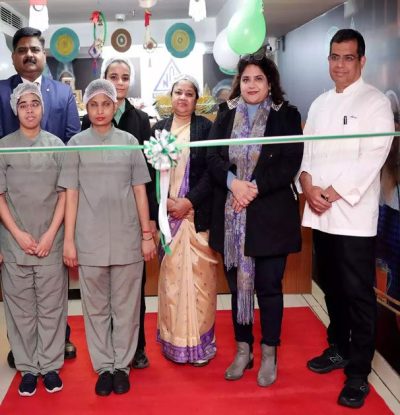NAB India Centre for Blind Women & Disability Studies
Visionary Leader for Blind Women’s Empowerment
Meet Mrs. Shalini Khanna Sodhi, the dynamic Founder Director of NAB India Centre for Blind Women and Disability Studies, nestled in the heart of Hauz Khas Enclave, New Delhi. As a pioneer in the field, she also holds the prestigious position of Chairperson at the Skill Council for Persons with Disability (SCPWD). She has also played an important role as a game changer by being a Member of Prevention of Sexual Harassment Committies (POSH), for the cause of protection of women from sexual harassment at workplace.

In recognition of her selfless service panning over two decades empowering more than 23,000 plus blind women, she was awarded the prestigious award – Top 75 Women Transforming India 2021 among many other awards
Under her dynamic leadership, the NAB India Centre for blind women and disability studies was awarded Best NGO with Innovative Ideas 2020 in the ‘Ekam Fest’ by National Handicapped Finance Development Corporation (NHFDC) for the PwDs
*
Top 75 ' Women transforming India ' - Issued by NITI Aayog and UN · Mar 2022
*
Rashtriya Prernadoot award - Issued by Ministry of social justice, Depwd, Govt. of India and Family of Shirdi Sai · Dec 2021
*
Lions club services award - Issued by Lions Club · Aug 2021
*
Award for purpose - Issued by WESS Foundation and Paras Hospitals · Apr 2015
*
Woman's achiever's award 2015 - Issued by Dainik Jagran, Delhi · Mar 2015
A distinguished post-graduate in English Literature, Industrial Relations, and Personnel Management, Ms. Shalini Khanna’s journey is marked by her unwavering commitment to the rehabilitation and research of visually impaired individuals, particularly focusing on women. Her credentials include RCI certification for the Rehabilitation of the visually impaired, showcasing her dedication to making a meaningful impact.
With over two decades of experience as a Disability Rehabilitation and Research Professional, Ms. Khanna’s journey began at a young age of 24, where she volunteered at the National Association for the Blind, School Branch in Delhi. Her passion for advocating for visually impaired women deepened as she dedicated herself to the welfare of students, recognizing the substantial challenges faced by blind individuals.
In the year 2000, the Asian Blind Union entrusted her with a pivotal research study, “Status of Blind Women in India,” spanning across all states. Ms. Khanna coordinated the comprehensive study, revealing the harsh realities faced by blind women in India – limited opportunities for higher education and a lack of pathways to employment. This eye-opening experience prompted her to establish the Centre for Blind Women in Delhi in 2002, a significant decision that marked a turning point in her career.
Undeterred by challenges, Ms. Shalini Khanna embarked on this transformative journey, utilizing 60-year-old premises generously donated by Mr. and Mrs. Saradindu Basu. Facing initial resistance and skepticism, she initiated the centre with minimal funds and one employee. The daunting task included addressing the lack of understanding and exploration of the cause, compounded by the absence of precedents for a centre exclusively focused on blind women’s upskilling.
Overcoming the odds, Ms. Khanna tackled the safety and mobility issues faced by blind women by establishing a two-room hostel within the premises. Despite limited resources, she commenced operations with nine girl trainees and worked with one qualified staff who was a visually impaired person. The support from Microsoft enabled the establishment of the first Cyber Café for the blind in 2003, with subsequent efforts to secure donors for additional training programs.
In over 21 years, under Ms. Shalini Khanna’s visionary leadership and the guidance of a distinguished management committee, the NAB India Centre for Blind Women and Disability Studies has touched the lives of 25,000 disabled women and children and trained over 5,500 blind women, facilitating access to higher education, employment, and self-reliance. Through various training programs, awareness initiatives, and community outreach, the centre has Ms. Khanna’s influence extends beyond borders, as she has played a pivotal role in introducing international entrepreneurial training programs for the visually impaired to the country in recent years. Her relentless pursuit of empowerment and inclusion has undoubtedly left an indelible mark on the lives of those she serves.